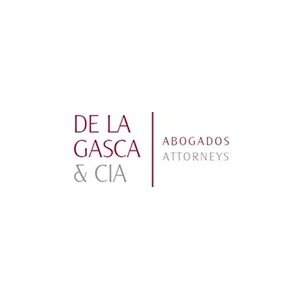Best Climate Change Law Lawyers in San Salvador
Share your needs with us, get contacted by law firms.
Free. Takes 2 min.
List of the best lawyers in San Salvador, El Salvador
About Climate Change Law in San Salvador, El Salvador
Climate Change Law in San Salvador, El Salvador, covers a range of legal measures and policies designed to address environmental challenges caused by climate change. These laws aim to regulate and mitigate greenhouse gas emissions, manage natural resources responsibly, protect vulnerable communities, and promote sustainable development practices. In recent years, the government of El Salvador has shown increased commitment to combating climate change, aligning national regulations with international agreements such as the Paris Agreement. Climate Change Law encompasses diverse areas, including energy policy, water use, waste management, land use, disaster risk reduction, and protection of biodiversity.
Why You May Need a Lawyer
Legal assistance in the area of Climate Change Law may be needed in various situations, whether you are an individual, a business owner, or a representative of a community group. Common scenarios include:
- Facing sanctions or fines for environmental violations
- Seeking permits for projects with potential environmental impact
- Addressing land disputes related to conservation or deforestation
- Compliance issues with evolving environmental regulations
- Challenging the legality of certain governmental or private activities that may worsen climate change
- Advocating for stronger government or corporate action on climate adaptation and mitigation
- Identifying and accessing climate funding opportunities for sustainable projects
A lawyer knowledgeable in Climate Change Law can help interpret complex laws, represent your interests in administrative or judicial proceedings, and advise on compliance and best practices to minimize legal risks.
Local Laws Overview
San Salvador falls under the national legal framework of El Salvador, which has developed a range of statutes and policies to address climate change concerns. Relevant laws and regulations include:
- Environmental Law of El Salvador (Ley de Medio Ambiente): Establishes norms for the protection of the environment and the rational use of natural resources, including climate-related obligations.
- Climate Change Policy (Política Nacional de Cambio Climático): Sets out the national vision and strategies for climate adaptation, mitigation, and resilience.
- Regulation on Environmental Permits: Requires projects with potential impact on the environment to undergo environmental assessment and obtain proper permits.
- Solid Waste Law: Addresses the management of waste as part of efforts to reduce emissions and pollution.
- International Commitments: El Salvador participates in agreements such as the Paris Agreement, which influences domestic climate policies and reporting obligations.
- Disaster Risk Management Legislation: Aims to enhance national capacities to respond to climactic disasters, which are frequent in the region.
These laws are enforced by a range of governmental bodies and often require coordination between local and national authorities for effective implementation.
Frequently Asked Questions
What is Climate Change Law?
Climate Change Law refers to a set of legal rules and policies designed to prevent, mitigate, or adapt to the effects of global climate change. This can include laws on emissions, conservation, sustainable development, and disaster response.
Who enforces Climate Change Law in San Salvador?
The Ministry of Environment and Natural Resources (Ministerio de Medio Ambiente y Recursos Naturales, MARN) is the primary institution in charge of enforcing climate and environmental laws in El Salvador, including San Salvador.
Do I need a permit to start a project that may impact the environment?
Yes, many projects must undergo an environmental impact assessment and obtain an environmental permit from authorities before starting operations. Failure to do so can lead to sanctions.
What penalties exist for violating environmental laws in San Salvador?
Penalties can include fines, suspension of activities, mandatory remediation, and in some cases, criminal prosecution for severe offenses.
How can communities protect themselves from climate-related risks?
Communities can advocate for proper enforcement of climate change adaptation policies, participate in public consultations, and seek legal remedies when laws are not followed or enforced.
What rights do individuals have regarding environmental information?
Individuals have the right to access public information related to environmental issues, participate in decision-making processes, and seek justice when adversely affected by environmental harms.
Can businesses obtain support for sustainable initiatives?
Yes, there are local and international programs offering technical and financial assistance for businesses pursuing sustainable and climate-friendly practices.
How does climate change law interact with land use in San Salvador?
Land use regulations must comply with national climate change policies, especially concerning deforestation, conservation areas, and urban planning that minimizes environmental impact.
What should I do if my community is affected by pollution or environmental hazards?
You can file a complaint with MARN, seek advice from environmental NGOs, or consult a lawyer to explore legal avenues for redress or compensation.
Where can I get legal advice on climate law in San Salvador?
You can consult private law firms, contact local bar associations, or seek support from NGOs specializing in environmental advocacy.
Additional Resources
If you need further information or assistance on Climate Change Law in San Salvador, the following resources can be valuable:
- Ministry of Environment and Natural Resources (MARN): Responsible for enforcement and implementation of environmental and climate change policies.
- Attorney General’s Office (Fiscalía General de la República): Handles legal complaints involving environmental crimes.
- National Civil Protection System: Coordinates disaster risk management and response to climate-related emergencies.
- Environmental NGOs: Organizations such as Fundación Salvador del Mundo (FUSALMO) and Unidad Ecológica Salvadoreña (UNES) provide support and advocacy on climate issues.
- El Salvador Bar Association: Can assist with referrals to qualified lawyers specializing in environmental or climate law.
- Academic Institutions: Many universities in San Salvador offer legal clinics or provide research and outreach on climate law topics.
Next Steps
If you need legal advice or representation on matters concerning Climate Change Law in San Salvador, consider following these steps:
- Identify your specific legal concern, such as permits, compliance, community rights, or dispute resolution.
- Collect all relevant documents and information related to your case or inquiry.
- Contact a lawyer with expertise in environmental or climate change law. You can find these professionals through legal directories, bar association listings, or recommendations from advocacy organizations.
- If financial constraints are an issue, explore free legal aid clinics or pro bono services provided by universities or NGOs.
- Prepare your questions in advance for your consultation to ensure all concerns are addressed efficiently.
- Stay informed about changes in relevant laws and policies, as climate change regulation is a rapidly evolving field in El Salvador.
Taking these steps will help you navigate the complexities of Climate Change Law and protect your legal rights while contributing to a more sustainable future in San Salvador.
Lawzana helps you find the best lawyers and law firms in San Salvador through a curated and pre-screened list of qualified legal professionals. Our platform offers rankings and detailed profiles of attorneys and law firms, allowing you to compare based on practice areas, including Climate Change Law, experience, and client feedback.
Each profile includes a description of the firm's areas of practice, client reviews, team members and partners, year of establishment, spoken languages, office locations, contact information, social media presence, and any published articles or resources. Most firms on our platform speak English and are experienced in both local and international legal matters.
Get a quote from top-rated law firms in San Salvador, El Salvador — quickly, securely, and without unnecessary hassle.
Disclaimer:
The information provided on this page is for general informational purposes only and does not constitute legal advice. While we strive to ensure the accuracy and relevance of the content, legal information may change over time, and interpretations of the law can vary. You should always consult with a qualified legal professional for advice specific to your situation.
We disclaim all liability for actions taken or not taken based on the content of this page. If you believe any information is incorrect or outdated, please contact us, and we will review and update it where appropriate.












